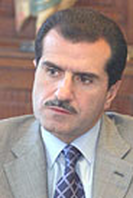 Nick Blanford, correspondent for The Times in Beirut, said today’s killing of Gibran Tueni has revived fears of Syria’s lingering control over Lebanon."Everyone is jumping to the conclusion that the Syrians must be responsible, bearing in mind that Tueni was probably the leading critic of Syria. He was elected to parliament in May and was a very vocal member of what was then the opposition and is now part of the government.
Nick Blanford, correspondent for The Times in Beirut, said today’s killing of Gibran Tueni has revived fears of Syria’s lingering control over Lebanon."Everyone is jumping to the conclusion that the Syrians must be responsible, bearing in mind that Tueni was probably the leading critic of Syria. He was elected to parliament in May and was a very vocal member of what was then the opposition and is now part of the government.
"This comes on the eve of the UN security council discussing the latest report of the commission investigating Hariri’s death. "There has been a feeling for some months now that Syria has a hit list of prominent anti-Syrian critics in Lebanon which they are working their way through. Tueni was the most prominent among them. "Tueni spent a lot of time in France, along with a number of other high-profile critics of Syria, because of the death threats. We believe he arrived back in Beirut yesterday and was driving from his home in the mountains to his office in Beirut on a winding road, passing the side of a steep valley.
"It seems that the bomb was in a car parked on the side of the road and the bombers were on the other side of the valley, where they had a clear view of the motorcade approaching. They hit the button as he went past, blowing his car off the road and into the ravine."The explosion was so fierce that windows in buildings in a nearby industrial estate were shattered."At first people thought that it was just another random car bomb attack but as the news trickled through that Tueni had been killed there was a genuine sense of shock. He was an extremely well-known figure."I was at the scene when one of the police officers went up to a man who worked with Tueni, and told him. He broke down in tears… just put his head in his arms on a car and sobbed.
"Tueni was seen very much as a crusading journalist and used an-Nahar to push ahead the political agenda to get Syria out of Lebanon. More than five years ago he wrote an open letter to Bashar al-Assad, who was to become President four months later when his father Hafez al-Assad died, saying that the relationship between Syria and Lebanon had to change – this was a taboo subject at the time, and really set the ball rolling for the campaign which eventually led to the Syrian withdrawal earlier this year.
"There is now a huge demonstration building up outside the offices al an-Nahar. The Lebanese are in no doubt that Syria is involved in this, but Syria has turned round and said ‘prove it’.
"The Syrians say it is not in their interests to go around killing these high profile opponents. The argument has some sway in Syria, but there will be few tears shed there for Tueni.
"It will be interesting to see the reaction of the UN report team tomorrow. We have heard that it was already going to be quite critical of Syria in terms of the co-operation it is not offering to the Hariri investigation. There are growing calls for the imposition of sanctions against the leaders and the country as a whole.
"The troops have gone but one can never be sure what intelligence operatives linger.
"If indeed Syria was responsible it would be these agents who perpetrated the attack. Although the visible presence has disappeared, the shadow of Syria still casts a pall over Lebanon. The country is going through a rather tricky transition from full Syrian rule to full independence – events such as this show that it is not there yet."



